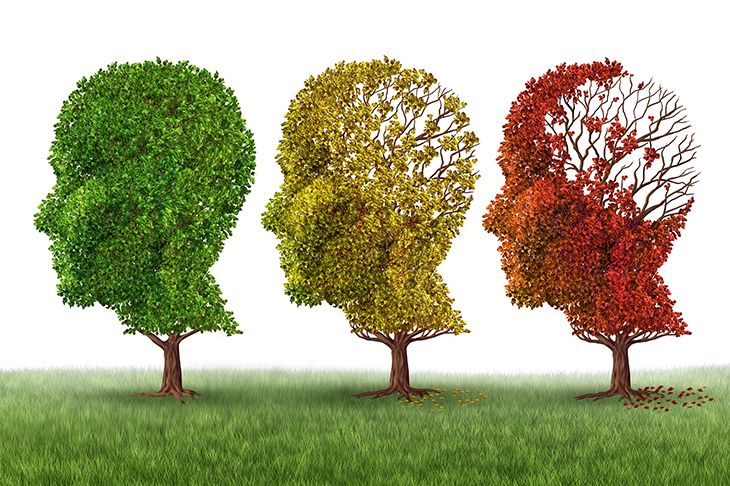My 91-year-old father-in-law has always had a terror of hospitals. This dates from his time as a Royal Marine when, just after the second world war, he was infected with polio by a contaminated needle. The first he knew of it was when a visiting dignitary came on board ship and he was unable to lift his arm in salute. Ever since, he made it very clear that he doesn’t want to go to a hospital under any circumstances, ever.
But last week he was admitted to A&E with a high temperature and I didn’t fret for one moment that he’d be alarmed. Why? He’s got late-stage dementia. He’s forgotten that he was ever frightened of needles or men in white coats. In fact, he rather enjoys the kind attention of the nurses.
Dementia gets a lot of flak, but it has its advantages. These are not inconsiderable. At a time of life when moving around can be difficult, little things can entertain, then entertain again. And again. A friend’s mother adored racing, so he recorded the Derby for her and she watched it, rapt, every afternoon, never knowing which horse would win. Old quarrels are forgotten. My father-in-law spent the past 50 years being cross with my saintly husband, with whom he was in farming partnership: now he’s all sweetness. He was livid when we proposed, a few years ago, that it was time for him to stop driving, but the rage is gone.
One elderly couple I knew lived in disharmony for decades. The wife did everything she could to keep her husband at arm’s length — until she got dementia and forgot that she couldn’t stand him. By the time she died, she was a devoted wife, to her husband’s delight and considerable surprise. This late and unexpected flowering made his widowhood much happier.
For the adult children of dementia sufferers, too, the condition offers lots of perks. For one, you don’t have to feel guilty if you don’t go and see the aged parents all the time. Far from drumming their fingers, waiting for the family to phone or visit, the demented seem perfectly happy sitting in a chair. Resentment and anxiety appear to be things of the past. Having the retentive capacity of a goldfish means they lose all track of time: a micro visit is just as good as an hour or two. When I went to visit an elderly friend who’d lost her marbles, her face lit up at the sight of me. I was so pleased. But pretty soon she stood up and said ‘Well, that was nice’, signalling that our interview was over. I’d been with her for less than three minutes.
Sensory pleasures can increase. Once dementia took hold, my late mother-in-law, who had never knowingly eaten more than the odd biscuit, forgot her aversion to food and cheerfully ate Sunday roasts. Even dishes with garlic or onions, which she’d refused for decades, began to be appreciated.
Some dementia sufferers experience vivid hallucinations. An old boy I was very fond of confided that he’d been having the most marvellous time, because wherever he went he was attended by a large retinue of comely Turkish women. This was evidently much more fun than his real life. It would surely have been churlish to disabuse him.
But the main plus dementia brings is the banishment of mortal fear. My mother-in-law was highly intelligent: she had worked at Bletchley and was a crossword and anagram wizard. After she began to show the signs of dementia, I worried that she’d be terrified of what lay ahead: that there would be a moment when it dawned on her that forgetting the date, or whether she’d posted a letter, might signify an awful darkness ahead. But that moment never came.
I had cancer earlier this year, so mortal fear has been my companion for months. It wakes me up in the night, and leaps out when I’m walking the dogs or reading. Its bony finger jabs me right in the solar plexus. Logic would suggest that the older you get, the more mortal terror would intrude. But people with dementia are utterly free of it.
The disease has its downsides, of course. Perhaps these are most keenly felt by the family. To a large extent, we are our memories: without them we exist in a kind of no man’s land, neither in possession of our own identity, not entirely denuded of it. This is very sad to behold; but it’s hard to say, really, how sad it is to experience. Similarly, what’s euphemistically referred to as ‘the loss of dignity’ seems appalling to the onlooker. But no dementia sufferer that I’ve met has chosen to jump off a cliff rather than use an incontinence pad.
I often think of Philip Larkin’s line about the aged: ‘Why aren’t they screaming?’ Dementia’s gift is make them forget that they ought to.
Got something to add? Join the discussion and comment below.
Get 10 issues for just $10
Subscribe to The Spectator Australia today for the next 10 magazine issues, plus full online access, for just $10.
You might disagree with half of it, but you’ll enjoy reading all of it. Try your first month for free, then just $2 a week for the remainder of your first year.














Comments
Don't miss out
Join the conversation with other Spectator Australia readers. Subscribe to leave a comment.
SUBSCRIBEAlready a subscriber? Log in